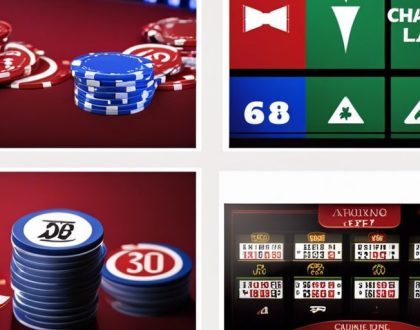Psychological Impact of Losing Bonus Wins

Bonus wins in any form, whether it be from a game, competition, or work incentive, have the power to significantly impact our psychological well-being. The thrill of winning a bonus can elevate our mood, boost our confidence, and even motivate us to perform better. However, on the flip side, losing a bonus that we were counting on can have detrimental effects on our mental health.
Studies have shown that the psychological impact of losing bonus wins can lead to feelings of disappointment, frustration, and even a sense of failure. This emotional rollercoaster can sometimes result in decreased self-esteem, demotivation, and in some cases, it can even trigger symptoms of anxiety and depression. It is crucial for individuals to be aware of these potential outcomes and to develop healthy coping mechanisms to navigate the highs and lows of bonus wins and losses.
The Lure of Bonus Wins
A bonus win in gambling refers to an additional payout or reward beyond the standard winnings. This extra prize can act as a strong motivator for players to continue playing, often leading to heightened excitement and anticipation. The lure of bonus wins lies in the potential for greater returns on the initial bet, creating a sense of thrill and suspense for the player.
Definition and Types of Bonus Wins
Wins in gambling can come in various forms, with bonus wins being one of the most sought-after outcomes for players. These additional rewards can be categorized into different types, including free spins, multipliers, cash prizes, jackpots, and progressive bonuses. Each type offers players a unique opportunity to increase their winnings and extend their gameplay.
| Free Spins | Extra spins awarded without requiring additional bets |
| Multipliers | Increases the payout by a certain factor |
| Cash Prizes | Direct monetary rewards on top of standard winnings |
| Jackpots | Massive rewards for hitting specific combinations or milestones |
| Progressive Bonuses | Accumulating rewards that grow over time or with each play |
After experiencing a bonus win, players are often eager to chase after more, fueled by the exhilaration of winning big.
The Psychological Mechanisms Behind Bonus Attraction
Psychological studies have shown that bonus wins trigger a range of cognitive and emotional responses in players, contributing to their attraction. The anticipation of a bonus activates the brain’s reward system, releasing dopamine and creating a sense of pleasure and satisfaction. This neurological response reinforces the behavior of seeking out bonus wins, leading to a cycle of excitement and engagement.
The lure of bonus wins taps into human psychology by offering tantalizing rewards that keep players coming back for more. The prospect of achieving a jackpot or unlocking a special bonus can be highly motivating, driving players to continue playing in hopes of experiencing that same rush of excitement and success.
The Dynamics of Losing Bonus Wins
Immediate Emotional Responses to Loss
Little can compare to the intense emotional rollercoaster individuals experience when they lose a bonus win. The feelings of disappointment, anger, frustration, and even disbelief can be overwhelming. It is not uncommon for individuals to go through a range of emotions in a short period, struggling to come to terms with the loss.
Longer-Term Psychological Effects
Any loss, especially when it involves bonus wins, can have a significant impact on a person’s mental well-being in the long run. The psychological effects of losing bonus wins may manifest in various ways, including increased stress, anxiety, and even depression. Individuals may also experience a loss of motivation or confidence, as well as feelings of regret or self-blame.
On a deeper level, the longer-term psychological effects of losing bonus wins can lead to changes in behavior and outlook on life. Individuals may become more cautious or risk-averse, fearing further losses and missing out on potential opportunities. The emotional scars left by the experience can linger, influencing how they approach future challenges and decisions.
Bonus wins can be a double-edged sword, offering an initial thrill and excitement but also carrying the potential for psychological turmoil if lost. It is vital for individuals to recognize and address the psychological impact of losing bonus wins, seeking support and coping strategies to navigate through the emotional aftermath effectively.
The Impact on Mental Health
Anxiety and Depression Resulting from Losses
For individuals who have experienced a series of losses in bonus wins, the psychological impact can be significant. Anxiety and depression are common reactions to the stress of losing out on expected rewards. The feeling of disappointment and frustration can lead to a sense of helplessness and hopelessness, making it difficult for individuals to bounce back from their losses.
With the continuous anticipation of winning more bonuses, the constant cycle of disappointment can take a toll on mental health. The pressure to keep up with previous wins or to recoup losses can create a sense of urgency and desperation, further exacerbating anxiety and depression symptoms.
The Risk of Developing Gambling Disorders
Gambling can become a slippery slope, especially when chasing bonus wins. The lure of potential rewards can lead individuals to engage in risky behaviors, including spending more time and money than intended. The risk of developing gambling disorders increases when individuals prioritize gambling activities over other responsibilities and interests in their lives.
Health professionals warn that gambling disorders can have a profound impact on individuals’ lives, leading to financial problems, strained relationships, and compromised mental health. Seeking help and support from mental health professionals and support groups is crucial for individuals who may be at risk of developing gambling disorders as a result of chasing bonus wins.
Coping Mechanisms and Loss Recovery
Behavioral Approaches to Coping with Loss
After experiencing the loss of bonus wins, individuals often turn to behavioral approaches to cope with their emotions and start the process of recovery. Engaging in physical activities such as exercise or sports can help release endorphins, which are known to boost mood and alleviate feelings of distress. Additionally, spending time with friends and loved ones can provide a sense of social support and distraction from negative thoughts associated with the loss.
Cognitive Therapeutic Strategies to Mitigate Negative Effects
One effective cognitive therapeutic strategy to mitigate the negative effects of losing bonus wins is cognitive-behavioral therapy (CBT). CBT focuses on challenging and changing negative thought patterns that contribute to emotional distress. By identifying and reframing maladaptive thoughts related to the loss, individuals can develop a more positive outlook and better cope with the situation. This approach can help individuals regain a sense of control and resilience in the face of adversity.
Another crucial cognitive therapeutic strategy is mindfulness meditation, which involves staying present in the moment and observing thoughts and emotions without judgment. This practice can help individuals cultivate self-awareness and acceptance, allowing them to process and navigate their feelings of loss more effectively. By incorporating mindfulness techniques into their daily routine, individuals can reduce anxiety and rumination, ultimately promoting emotional balance and well-being.
Individual Differences in Reaction to Loss
Your reaction to losing bonus wins in gambling can vary based on several individual differences. Understanding how personality traits, resilience, and coping styles can influence your response is crucial in managing the psychological impact of losses.
Personality Traits and Response to Gambling Loss
Differences in personality play a significant role in how individuals respond to gambling losses. For example, individuals with high levels of neuroticism may be more prone to experiencing heightened negative emotions such as anxiety and depression when faced with a loss. On the other hand, individuals with high levels of extraversion may be more likely to seek out social support or engage in activities to distract themselves from the loss. Recognizing your own personality traits can help you understand and regulate your emotional responses to gambling losses.
The Role of Resilience and Coping Styles
Loss of bonus wins can be particularly challenging for individuals with low resilience or maladaptive coping styles. Resilience, which refers to the ability to bounce back from adversity, can impact how effectively an individual manages the distress of a loss. Those with high resilience tend to view setbacks as temporary and are more likely to adapt and move forward. Coping styles, such as problem-focused coping (actively addressing the issue) or emotion-focused coping (managing emotions related to the loss), can also influence how individuals navigate losses in gambling.
Gambling losses can trigger a range of emotional responses, and it is important to recognize the role of individual differences in shaping these reactions. By understanding how your personality traits, resilience, and coping styles influence your response to losses, you can develop healthier strategies for managing the psychological impact of losing bonus wins in gambling.
Preventative Measures and Responsible Gambling
Setting Limits and Maintaining Control
Not setting limits on your gambling activities can lead to impulsive decisions and financial repercussions. It is imperative for individuals to establish a budget specifically for gambling purposes and stick to it rigorously. Additionally, it is crucial to set time limits on gambling sessions to prevent getting carried away in the heat of the moment.
Tools and Resources for Prevention and Awareness
Any individual engaging in gambling activities should be aware of the various tools and resources available for prevention and maintaining responsible gambling habits. These tools include self-exclusion programs, deposit limits, and reality checks provided by many online gambling platforms. Utilizing these resources can help individuals keep track of their gambling behavior and intervene when necessary.
One important resource for prevention and awareness is Gamblers Anonymous, a support group aimed at helping individuals with gambling problems. This organization provides a platform for individuals to share their experiences, seek advice, and receive support from others facing similar challenges.
Responsible gambling involves acknowledging the potential risks associated with gambling and taking proactive steps to mitigate these risks. By setting limits, utilizing available tools and resources, and seeking support when needed, individuals can engage in gambling activities responsibly and enjoy the experience without detrimental consequences.
Final Words
Presently, the psychological impact of losing bonus wins can be significant for individuals who have come to rely on such rewards for motivation or validation. The disappointment and sense of loss that can come from missing out on these bonuses can lead to feelings of frustration, self-doubt, and even demotivation.
It is important for individuals to recognize the potential impact of losing bonus wins on their mental well-being and to take proactive steps to mitigate any negative effects. Seeking support from friends, family, or mental health professionals, practicing self-care, and focusing on personal growth and achievements beyond external rewards can all help to navigate and overcome the psychological challenges that losing bonus wins may bring.
FAQs:
What are bonus wins, and how do they impact psychological well-being?
Bonus wins, whether from games, competitions, or work incentives, can significantly impact our psychological well-being by elevating mood, boosting confidence, and motivating performance. However, losing a bonus can lead to feelings of disappointment and frustration, affecting mental health negatively.
What types of bonus wins are commonly encountered in gambling?
Common types of bonus wins in gambling include free spins, multipliers, cash prizes, jackpots, and progressive bonuses. Each type offers players opportunities to increase winnings and extend gameplay.
What psychological mechanisms contribute to the allure of bonus wins?
Bonus wins trigger cognitive and emotional responses by activating the brain’s reward system, releasing dopamine, and creating a sense of pleasure and satisfaction. This reinforces the behavior of seeking out bonus wins.
How do individuals typically respond to losing bonus wins?
Losing bonus wins can evoke intense emotional responses such as disappointment, anger, and frustration, leading to long-term effects like increased stress, anxiety, and even depression. Coping mechanisms and support are crucial in navigating these challenges effectively.
What measures can individuals take to engage in responsible gambling and mitigate the risks associated with chasing bonus wins?
Setting limits on gambling activities, utilizing tools and resources for prevention, and seeking support from organizations like Gamblers Anonymous are essential steps in practicing responsible gambling and maintaining mental well-being.
Recommended Posts

Risk Management in Online Gambling
July 3, 2024

Bragg Gaming Expands with Hard Rock Casino
July 3, 2024





